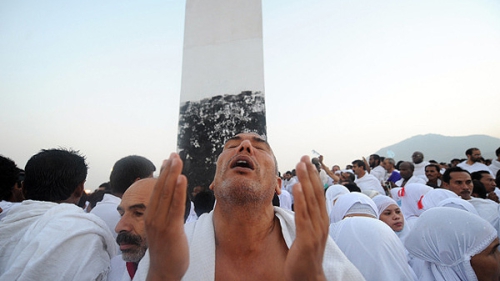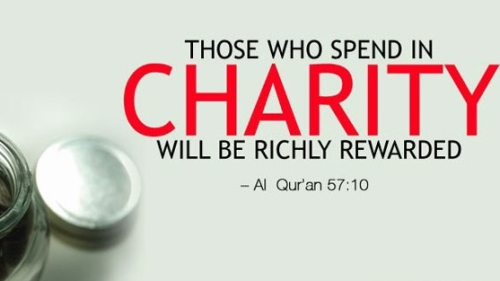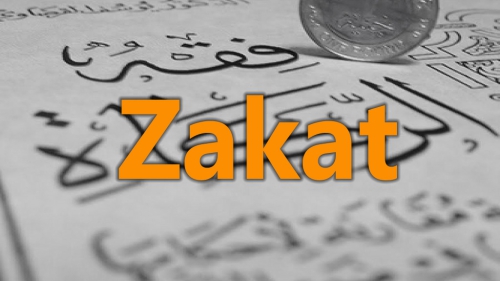Spending for Allah - Creating Love of Humanity

Spending in the way of Allah is a great virtue. It occupies paramount importance in divine religions. All Prophets of Allah emphatically urged their followers to spend in the way of Allah. In this article, we shall take a brief look at some of the blessings of spending in the way of Allah.
True Attachment with God
The greatest benefit of spending in the way of Allah is that it establishes a strong bond between a person and his Creator. A man's heart generally lies where his wealth is. If he hides away his wealth in some secret place, he finds himself thinking about that very place all the time. In case of investment in a business or a company, he cannot help being pre-occupied with the continued viability of the investee. In short, what is evident from practical experience is that man's heart is affixed to his wealth. Keeping in view the foregoing explanation, it can be asserted that anyone who spends in the way of Allah would find that he is in an everlasting communion with God since he has entrusted Allah with his wealth. In this regard, Jesus (sws) is reported to have said:
Lay up for yourselves treasures in heaven where neither moth nor rust destroys and where thieves do not break in and steal. For where your treasure is, there your heart will be also. (Mathew 6:20-1)
Stronger Ties with the Society
The second benefit which spending in the way of Allah affords the spender is that it helps him establish unfailing ties with his society. A little deliberation here will reveal that this achievement is not of less significance. Rather, it is one of the two pillars upon which the whole structure of religion is based. These two pillars, namely: prayer and spending, are a pre-requisite in order to make a person a true servant of God. The first pillar helps in developing a true relationship with the Almighty. And the second inculcates a deep-rooted connection amongst the members of the society. Hence, both play an unsurpassed role in nurturing and developing the persona conceived by the Qur'an. It is precisely for this reason that Salah (the prayer) and Zakah (alms-tax) find mention in the Qur'an side by side. For example, in the initial verses of Surah Baqarah, what immediately follows the mention of Salah is spending in the way of Allah.
As pointed out earlier, these two pillars in fact constitute the foundations upon which the entire structure of man's relationship with the Creator and His creation is erected. Consequently, one can safely conclude that the fabric of the Shari'ah too is based upon the prayer and spending. All ancient Semitic religions regard both these pillars as the origin of righteous conduct. Once someone asked Jesus (sws) about the great commandment in the law. Jesus (sws) enlightened him by saying:
'You shall love the Lord your God with all your heart, with all your soul, and with all your mind'. This is the first and great commandment. And the second is like it: 'You shall love your neighbor as yourself'. On these two commandments hang all the law and the Prophets (Matthew, 22:37-40)
The best possible way to demonstrate affection towards a neighbor is to sympathize with him and help him out financially whenever he is in trying circumstances. Just as Salah is the only befitting way man can express his love for the Almighty, the only appropriate manner he can exhibit his appreciation for his neighbor is to spend for him whenever he is in need.
Both things apparently seem distinct and separate yet if are viewed from a holistic perspective the love of the neighbor would appear to be the direct outcome of the love of God. Anyone who loves God would certainly care for His creation since He has analogously regarded the whole mankind as His own children. Man is so created that whenever he loves someone he instinctively falls in love with everything related to him as well. So, when a person loves Allah he surely feels affection for His Creation and this affection ultimately results in spending to ease the sufferings through which the 'children' of his beloved Allah may be going.
The brimming love that man feels for Allah is the natural consequence of his sentiments of gratitude. When he observes carefully around himself the providence and power of Allah, he finds himself engulfed by the bounties of his Gracious Creator. This realization, on the one hand, gives rise to the sentiments of worship which naturally prompts him to offer the prayer and, on the other hand, induces him to be as much generous as possible to mankind since he has become cognizant of the fact that everything he possesses has been bestowed upon him generously by Allah alone.
It can therefore be concluded that the love for humanity is an offshoot of one's love for God and that both provide a rock-solid base for religion. While the former stands at the core of all human rights, the latter is the stream from which all religious obligations spring forth. Anyone who can willingly spend his wealth for others cannot be assumed to be careless when it comes to discharging other moral obligations. The only person who can be presumed to be the best member of a society is the one who has done away with his undue love of riches, because should this love prevail, it would awfully obstruct the normal flow of righteous conduct. The Holy Qur'an alludes to both situations in the following words:
So, he who gave in the way of Allah and was God-fearing and believed in the good outcome [in the Hereafter], We shall, indeed, take him to [a fate] of delight. And he who was a miser and was indifferent and belied the good outcome [in the Hereafter], We shall, indeed, take him to [a fate] of affliction. (Quran 92:5-10)
Spending nurtures Wisdom (Hikmah)
The third benefit of spending is that it is like food and water for all the other religious obligations and creeds. It helps, on the one hand, all those righteous deeds which are yet feeble and have shallow roots in our soul and, on the other hand, it strengthens all beliefs which have not yet gained sound basis in our heart.
This stability and depth of all virtues and beliefs in a person is exactly what the Qur'an describes as Hikmah (wisdom). From certain indications of the Qur'an we may construe that the key to this wisdom is indeed spending in the way of Allah. At one place, the Qur'an delineates the benefits of spending in the following words:
Satan threatens you with poverty and bids you to conduct unseemly. Allah promises you His forgiveness and bounties, and Allah cares for all and He knows all things. He grants wisdom to whom He pleases and he to whom wisdom is granted receives indeed a benefit overflowing. (Quran 2:268-9)
Only that spending brings this benefit to the spender which has been carried out in order to please Allah alone and to reinforce what is yet feeble in heart. Therefore, the parable described just before the above quoted verses begins as:
And the likeness of those who spend their substance seeking to please Allah and to strengthen their souls. (Quran 2:265)
The part 'to strengthen their souls' implies that they spend in the way of Allah contrary to the ill wishes of their heart so that they can overcome all the impediments, which stand in their way to being a Godly person. The reward that God promises them in return is that He will of surety bless them with His bounties and bestow upon them the treasure of priceless wisdom.
Increase in Wealth
The fourth benefit of spending in the way of Allah is that it augments the wealth of the spender. The Qur'an says:
The parable of those who spend their substance in the way of Allah is that of a grain of corn: It grows seven ears and each ear has a hundred grains. Allah gives manifold increase to whom He pleases and Allah cares for all and He knows all things. (Quran 2:261)
The Qur'an sheds light upon this fact in the following words as well:
Allah blights usury and augments what is spent in His way. (Quran 2:276)
This spending no doubt will bear fruit in the Hereafter but in this very world the person who spends in God's way enjoys a fabulous increase, for the needy people who are helped pray for their benefactor. And, as these people are pitiful, they much deserve that their prayers be granted by the Merciful Master. From some Ahadith, we find that even the Angels of God pray for such a person:
The Prophet said: 'Every day two angels come down from Heaven and one of them says: 'O Allah! Compensate every person who spends in Your cause', and the other [angel] says: 'O Allah! Destroy every miser'. (Bukhari: No. 1374)
It is, however, to be noted here that this 'increase' in no way means that the spender would find his safe overflowing with wealth or that his bank balance would increase or that the value of his property would augment overnight. Rather, it implies that the optimal benefit one can attain from the use of wealth is afforded to the person who spends in Allah's way. The benefit his wealth brings to mankind, others' wealth cannot undertake to fetch; the contribution his wealth helps make to the welfare of the society, others' wealth fails to make; how he succeeds to please the Lord, others remain unsuccessful; the profound respect and love he earns in others' hearts, others obnoxiously obsessed with piling up their riches cannot even visualize and, above all else, peace of mind, the spiritual elevation and satisfaction that he drives from this spending are in fact blessings which have eluded many grand emperors of this world.
Source: Renaissance
Topics: Allah, Wealth Values: Love, Spirituality
Views: 6535
Related Suggestions
but do not obey HUKKUL EIBAD,and also Speak lies for his own benefit.
No.2 question.A person do not pray but obey the HUKKUL EIBAD.
so can you please explain me the difference betwee
n this two whos is better person.
No.3 question.how many times salath (namaqz)is written in QURAN.
awaiting for your right reply.
salams.
do not obey the HUKKUL IBAD/and tells lies.
"Anyone who loves God would certainly care for His creation since He has analogously regarded the whole mankind as His own children."
from this article - Spending for Allah - Creating Love of Humanity
11/23/2002 - Religious - Article Ref: RI0211-1793
By: Jahangir Hanif
Renaissance Islamic Journal*
A true Muslim can never say that, because it is totally against the Islamic aqedah and wrong. I sincerely plea and urge those responsible in propagating that wording to comeback to the true teaching of Islam by read and understand the meaning of surah Al-Iklas in Al-Quran (translation);
In the name of Allah, Most Gracious, Most Merciful.
[1] Say: He is Allah, the One and Only;
[2] Allah, the Eternal, Absolute;
[3] He begetteth not, nor is He begotten;
[4] And there is none like unto Him.
In this surah, Allah clearly says that He does not have a parent nor does He has children (He begetteth not, nor is He begotten). Please do not propagate deviation of Islam whether directly or indirectly. May Allah guide the muslim, guide to the path that please Him.
Abdul Rahman.
Salaam, why is it that we believe that anything in Islam is done for allah. Making statements like "Spending for Allah" is absolutely incorrect. God does not need anything he is completely independent of everything. Fasting, charity, salat, studying Quran, etc... is done for our benefit and ours alone. It might indirectly affect someone else, but mainly ourselves. Basically, the concept is incorrect. Islam does not force us to do anything. mostly, god recommends that we do certain actions that will improve our lives here.
At work people ask me why I don't drink alcohol, I reply to them that I choose not to drink because it is better for me. Thanks for reading and if anyone wishes to discuss please send me an email.
Salaam
from me Nasrin...
brothers and sisters and to follow the rules and
follow the sunnah of prophet saw.
May Allah please shower vast blessings upon the Prophet Muhammad and please deliver to him our greetings of peace in this sacred month. Also, is it permitted to ask for peace and blessings (for any of Allah's prophets) within a computer password?
Ramadan Mubarak,
Yahya Bergum
Since many famous persons are really ignorant of what Islam is, this short and excellent article will generate interest in them to know the Truth, inshaAllah. I suggest your sending this to such soft natured billionaires like Bill Gates, Bill Clinton, his wife or any other famous personalities you can think of including President G.W. Bush! Choice is yours!
Allahi salmakh.

















